MAINE REDUX
We flew back across the Atlantic to Boston, June 1963, a family larger by one-fifth, Laura nearly 4, Carol 2, Richard 6 months. Ever the peaceful baby, Richard slept for most of the flight. Elizabeth had made arrangements for our summer, in a Harvard graduate student apartment vacant for summer break. Letters had crisscrossed the Atlantic, hers proud of the find, ours whining about her officiousness and interference. Elizabeth wanted us to be close to them, or did she not want the five of us at the Memorial Drive apartment? She bought chrome clothes racks to serve as closets. She also brought in bedding and towels, and had the place cleaned for our arrival. So we had our own place when we arrived, jet lagged and tired, thanks to Elizabeth. For a few days, everybody woke up at all hours of day and night, in that disconcerting space of not knowing where we were or what time it was.
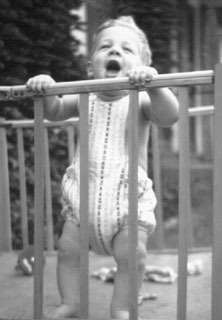
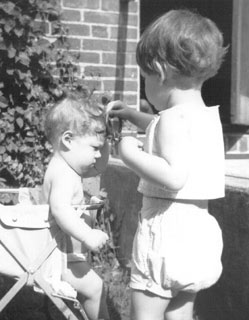

Richard, Carol and Laura, Shaler Lane, summer 1963
Shaler Lane was a short dead-end street, two rows of two-story apartments lining the street, complete with a fenced-in playground. A short walk took us to the folks' apartment overlooking the Charles River. Our 6-week stay was good for the children. For the first time, they had playmates their own age and a safe place to play. For us adults, it was another story. Boston is not a summer destination. Robert and I slept under a fan, but still, in nights of 100% humidity, the thermometer pegged above 80° Fahrenheit, we'd hop in the shower and come back to bed dripping wet. It didn't help much. Instead of hot dry sheets, we had hot wet sheets.
This was our last summer with Laurence, a complex character. His wit stayed with him to the end, but his temper could make an enemy in a flash. He desperately wanted to be loved but had no idea how to be lovable. He paid the girls a regular afternoon visit, bringing offerings of fruit or ice cream like a latter-day Magus. One stormy afternoon his figure, clad in a dark raincoat, suddenly filled the door, and the girls scattered in panic. Laurence stood on the doorway like a large wet dog, melting ice cream in hand, for a long time. Having gathered his thoughts, he marched off in the rain, yelling that Robert and I set the children up to hate him. Elizabeth, ever a believer in the miracles of modern medicine, told us to take them to a pediatrician for a thorough checkup to find out why they were so shy. We didn't do it.

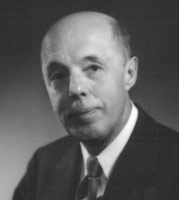
Elizabeth and Laurence
As summer neared its end, once more we headed for Maine. Arriving in Lewiston after a year in England, I was bemused that everything was still there, stores, streets, houses. I had changed but Lewiston felt frozen in time like a Rip van Winkle community. The house on Labbe Avenue was already spoken for, and we ended up renting a much newer, unfurnished house on a treeless lot on Highland Avenue. Our spare time for months to come was spent scouring the used furniture section of the local rag. We slept on the floor for several weeks and never fully furnished the place.

The house on Highland Avenue
A river ran through town, the Androscoggin, memorable for obscene pollution. The fast-flowing water was a thick, bilious gray-brown, with a smell to match its looks. The twin cities of Lewiston and Auburn are the industrial core of the state, and the river was used as a dump by the various industries. Pollution caused by paper mill discharges produced fumes rumored to peel paint off nearby structures. I hear that the Androscoggin has staged a remarkable comeback subsequent to the Clean Water Act, marshaled through congress by Bates College alumnus Edmund Muskie.
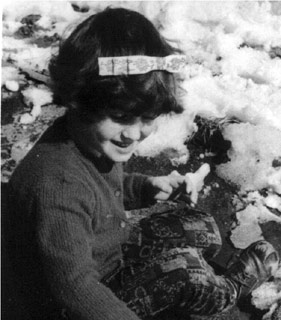

Laura and Richard, spring of 1964
I find it surprising that I remember so many trivial things about that year. Our next-door neighbor had lost both legs at the hips to diabetes. He looked like a human stump. In spring and summer, he pushed himself around the yard, cultivating the rows of bean plants. His wife complained how useless the man was. Robert missed a week of classes with a bout of flu and viral pneumonia. He seemed surprised at his relapse from walking to the college in waist-deep snow. He also had a bicuspid tooth extracted. The tooth had become sensitive and Robert told the dentist to yank it. I was mortified that he refused to put in a bridge—my husband had a gap in his mouth from that time on, and I didn't like it one bit. The extraction, he told me, was a one-hour torture. The tooth broke deep inside the gum and the dentist had to chisel out the root.


Carol and Richard, spring 1964
Friday, November 22, 1963, I was ironing in the kitchen when Robert walked in the door to tell me that John F. Kennedy had been assassinated. My first thought was for Jackie, now a widow. I think that reflected my own dread of losing Robert and being left to raise the children by myself. I drove into town that afternoon, feeling very gloomy, and was surprised that everybody else looked sad as well.
A month later, 2 am on December 23, the phone rang. It could only be one thing at that hour: the last of several heart attacks had finally taken Laurence. Elizabeth wanted comfort, no doubt, but Robert never did have patience with crying women. He told her to go back to sleep— yes you can go back to sleep, I know you can, just do it now —and curled back under the covers to do the same. We traveled to Boston for the funeral service a few days later.
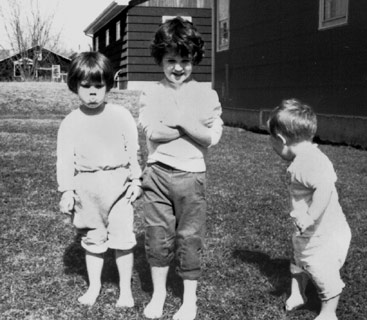
Forty-degree weather, what passes for spring in Maine
This was the year I began to type and proofread Robert's books, in between wiping noses and bandaging skinned knees. He didn't push me— honeychile, you'll have no time for yourself —but Superwoman here was honored to help. In all, I would play an active part in the thirteen books he published before our divorce in 1979. I also took refuge in eating, especially sugar. I would feed lunch to kids and husband while saving my hunger for later. While Robert and the kids took a nap, I'd brew a tall cup of coffee, pop a bowlful of popcorn, and open up a bag of Tootsie Rolls. In a quiet house with nobody watching, it was payback time.
Robert was a man of multiple hang-ups. One of these was his supposed need for afternoon naps, a need that began during this second year in Lewiston and which would become a permanent imposition on the rest of us. For instance, we did not own a clothes dryer, so in winter I hung diapers up to dry in the basement. The diapers were large square pieces of cloth, not prefolded diapers, and they stuck together from spin drying in the washing machine. I would shake them open to remove the creases. Robert complained that the slapping noise I made shaking off the diapers, one floor below, kept him awake.
A job opportunity in the newly-formed UC Santa Barbara opened early in 1964. Initially, Robert played hard to get— Santa Barbara was too conservative, UCSB not a first-rate school, the library had to be inadequate for his research. But for me, ah California! Especially from the snows of Maine, California offered sunshine, warmth, beaches, mountains. I tried not to let my enthusiasm show, least I jinx the deal. California felt closer to Brazil, an illusion because the whole of the United States lies westerly of South America. He begged out of a personal interview, probably a good move, because his uptightness might have cost him the job. The offer was for assistant professor, not the tenured professorship Robert felt he deserved. But his one-year assignments were over. We would now at least have a permanent place to call home.

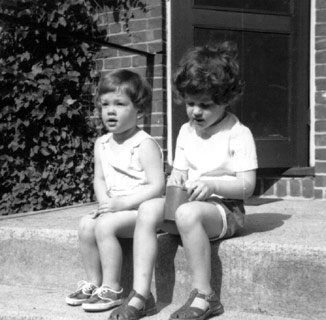
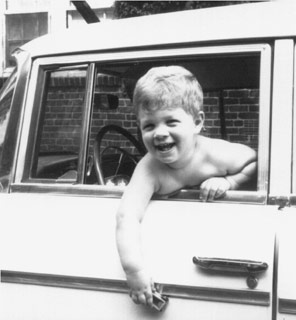

Richard, Carol, Laura with new car and new tricycles, Cambridge, summer 1964
We bought a car before flying across the country, a low mileage Rambler station wagon. I think Elizabeth wanted a car to visit a friend outside Boston, and we reasoned that cars were cheaper on the East Coast anyway. Used-car warranties were unheard-of then, and we ended up with a nice-looking car with a cracked engine block, thanks to the stuttering of the salesman who accompanied us on the test drive. I tried to read off the used car checklist from Consumer Reports so Robert could watch for such things as puffs of exhaust, but the dealer interrupted any attempts at testing with “I as-s-s-sure you, t-t-t-this is a v-v-v-very g-g-g-good c-c-c-car, I am the m-m-m-m-anager.” We had to wait a long time for the m-m-m-m-manager to finish, and he kept producing ever more laborious new sentences. We were vastly annoyed, but who can interrupt a poor benighted stutterer in the business of selling cars? Robert was impressed by the freshly-painted engine and didn't want to miss out on the bargain. He forked over the $700 asking price. The graduate student who drove it to California complained that fuel and oil alone cost him more than a bus ticket.